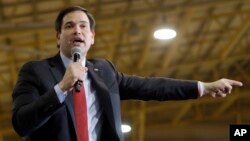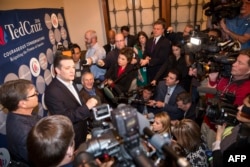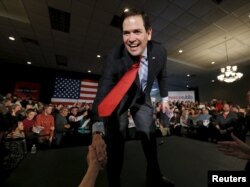March 1 was Super Tuesday in the campaign for the U.S. presidency, but March 15 is shaping up to be a key date in determining the nature of the Republican race.
Businessman Donald Trump, leading in national polls for months, has used that support to win the most state primaries and caucuses so far. But while the once-massive Republican field has dwindled to five candidates, there have been calls for Republicans to unite behind a single opponent who can earn enough delegates to prevent a Trump nomination.
As of March 15, candidates can start earning all of a state's delegates with a win rather than just a portion based on their percentage of the vote. It's also when two key states – Florida and Ohio – have winner-take-all primaries.
Senators Ted Cruz and Marco Rubio have been running about even in polls, both lagging far behind Trump. Neither has shown any sign of considering leaving the race. After Tuesday's voting in 11 states, Cruz called for candidates who have yet to win a state to consider "coming together, uniting."
"For those who have supported other candidates, we welcome you on our team standing united as one. That is the only way to beat Donald Trump," Cruz said.
Still too early to drop out
Analysts say it's too early for trailing candidates to consider stepping aside, given the way they could amass at least some delegates with the proportional system.
"I don't think you're going to see much until March 15," said Gary Nordlinger, an adjunct professor at George Washington University's Graduate School of Political Management. That's when "you have a whole bunch of primaries, including Florida, Rubio's home state. Rubio has plenty of money, he certainly has plenty of staying power. Why would he want to drop out?"
A candidate needs 1,237 delegates to clinch the Republican nomination. If no one gets to that level, the nominee will be determined at the party's convention in July.
Nordlinger predicted candidates who could afford to stay in the race would do so "if for no other reason than hoping that there's an open convention in Cleveland," the Ohio city.
Republican strategist Ford O'Connell said it would take two more weeks for the decisions on who stays in the race and for how long.
"I think that determination will be made on the 15th whether they're going to have a two-man race or pack it all in for a stretch run to the convention," O’Connell said.
Rubio is focused on Florida and its trove of 99 delegates. He told supporters there Tuesday night he accepts being an underdog in the race.
"We've all been underdogs. This is a community of underdogs. This is a state of underdogs. This is a country of underdogs. But we will win, and when we do we will do what needs to be done," he said.
Retired neurosurgeon Ben Carson has yet to win a state, but on Tuesday said he is not "not ready to quit."
Ohio Governor John Kasich also has yet to score a win and is counting on a boost from his state, where he trailed Trump by a few points in a recent poll.







